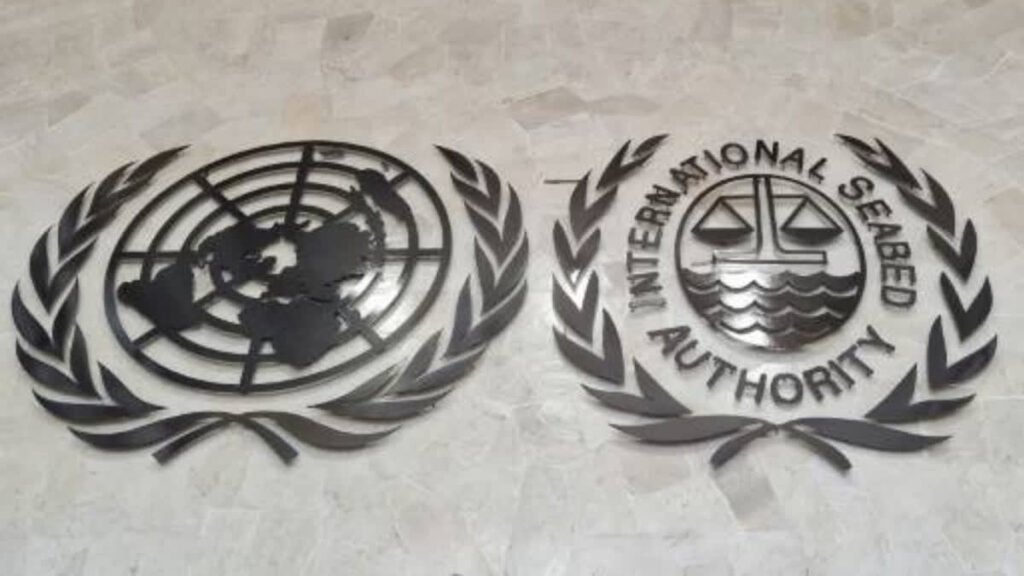INTERNATIONAL SEABED AUTHORITY STALEMATE OVER DEEPSEA MINING
Why in News?
- Despite 2 weeks of negotiations, the International Seabed Authority (ISA) has failed to reach a consensus on finalising regulations for deep sea mining.
- The latest session in Kingston, Jamaica, saw tensions rise amid growing pressure from the United States, which is attempting to fast-track seabed mining outside of the established multilateral framework.
WHAT IS DEEP SEA MINING?
- Deep sea mining involves the extraction of minerals such as cobalt, nickel, and manganese from the ocean floor, particularly in international waters.
- These metals are essential for electric vehicle batteries, renewable energy storage, and emerging green technologies.
BACKGROUND: INTERNATIONAL SEABED AUTHORITY
- Established: 1994 under the United Nations Convention on the Law of the Sea (UNCLOS)
- Headquarters: Kingston, Jamaica
- Mandate: To regulate mineral-related activities in “The Area” — the seabed and ocean floor beyond national jurisdiction — ensuring that the marine environment is protected and that resources are treated as the “common heritage of humankind.”
- Members: 169 countries (excluding the United States)
- India is a member of
HIGHLIGHTS OF 2025 ISA COUNCIL MEETING
Extensive Yet Inconclusive Negotiations :
- The ISA Council concluded a line-by-line reading of the proposed “Mining Code”, which consists of 107 regulations.
- The rules cover issues like environmental protection, contractor compliance, monitoring mechanisms, and resource-sharing.
- However, key areas of the framework remain unresolved, particularly those related to safeguarding marine ecosystems.
Call for Moratorium :
- Chile, representing a bloc of 37 countries, reiterated the demand for a moratorium on deep sea mining, stressing the lack of comprehensive scientific understanding of potential ecological impacts.
- Chile’s delegate, Salvador Vega Telias, emphasized that no exploitation should begin until a robust and equitable regulatory system is in place.
U.S. Pressure and Unilateral Action :
- In April 2025, U.S. President Donald Trump directed his administration to fast-track mining permits in both domestic and international waters, relying on a 1980 U.S. law, bypassing the ISA framework.
- The U.S. is not a party to UNCLOS and hence not a member of ISA, but its actions still have global ramifications.
Implications:
- This move is seen as a challenge to multilateral governance and international legal norms.
- It also raises concerns over a race to the bottom in terms of environmental standards and regulatory oversight.
Corporate Interest and Legal Dispute :
- The Metals Company (TMC), a Canadian firm, quickly submitted the first-ever request for a high seas mining license under the U.S. directive.
- This action has been widely condemned by NGOs and several ISA member states as an attempt to bypass international law.
Draft Resolution under Consideration :
- The ISA’s Legal and Technical Commission may be asked to investigate non-compliance and recommend appropriate measures against entities that act contrary to international law.
- The resolution refers to mining in defiance of the multilateral legal framework, including the UN Convention on the Law of the Sea.
Procedural Tensions and Transparency Concerns :
- Several delegations raised objections to the closed-door negotiations led by the ISA Council President, citing lack of transparency in matters concerning global commons.
- Emma Watson of the Deep Sea Conservation Coalition criticised the procedural shift, highlighting that the seabed is the “common heritage of humankind” and must be governed with inclusive and open debate.
GLOBAL CONTEXT & ENVIRONMENTAL CONCERNS
Ecological Impact :
- Scientists and environmentalists warn that deep sea ecosystems are among the least understood and potentially most vulnerable on the planet.
- Mining activities could irreversibly damage marine biodiversity, disturb carbon sinks, and affect fisheries.
Equity and Resource Sharing :
- Developing countries demand fair access to seabed resources and equitable sharing of profits, as laid down in the UNCLOS framework.
- The mining code is expected to lay down provisions for benefit-sharing, including royalties and technology transfers.
WAY FORWARD
- The ISA’s Assembly of 169 Member States will continue deliberations later this year.
- A binding legal framework must balance economic interests, technological innovation, and ecological stewardship.
- Greater scientific research, transparent negotiation processes, and inclusive global governance will be essential to prevent resource colonialism and environmental degradation in international waters.
Note: Connect with Vajirao & Reddy Institute to keep yourself updated with latest UPSC Current Affairs in English.
Note: We upload Current Affairs Except Sunday.

